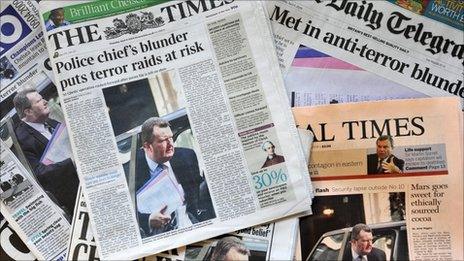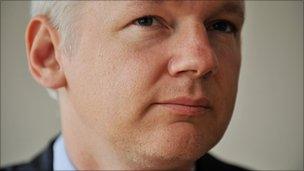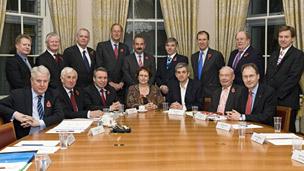D for discretion: Can the modern media keep a secret?
- Published
- comments

Newspaper chiefs reached a gentleman's agreement over Bob Quick's blunder
When the UK government wants to prevent the media from reporting something for national security reasons it issues what used to be known as a D-Notice.
Although they are now called Defence Advisory (DA) Notices, external the mainstream news organisations hardly ever ignore them.
But can this system still work in the age of citizen journalism when the media is so fragmented?
Twice a year, over tea and biscuits at the Ministry of Defence in Whitehall, senior editors sit down with senior civil servants to discuss what should be kept secret in the military, intelligence and counter-terrorism worlds.
Originally known as the D-Notice Committee, it has been in existence for nearly a century.
At first it was a forum for newspaper proprietors and military men only; now even internet giant Google has a seat on this very British institution.
"It's entirely voluntary," explains Bob Satchwell from the Society of Editors - one of the media bodies to sit on the committee.
"I don't think it's self-censorship. It's self-restraint."
Carrier pigeons
But when the first meeting of the committee took place in 1912, the newspapers were slightly embarrassed by their role in this venture.
"It was all kept very hush-hush," says Nicholas Wilkinson, the official historian of the D-Notice Committee and a former secretary of it.
"The press side didn't want the public to know they were co-operating with the government in a kind of voluntary self-censorship.
"The government, likewise, was very sensitive not to be seen to be censoring the press."
There were certainly D-Notices on some rather curious things back then.
For example, journalists were not supposed to make any mention of Rasputin and his relationship with "the highest personage in Russia".
And during World War I, they were asked not to refer to the existence of the government's carrier pigeon service for fear it would give the enemy useful information.
Nowadays the D-Notice Committee is called the Defence Advisory Notice System to stress that it does not involve enforced censorship of the media.
Gentlemen's agreement
Indeed, with 16 representatives on the committee to the government's five, the media outnumber the civil service by more than three to one.
"There isn't any real pressure I can apply to journalists," says Air Vice-Marshal Andrew Vallance, the committee's current secretary.
"All I can try to do is to convince them of the consequences if they publish or broadcast certain information which might damage national security."

Julian Assange agreed to some material being blanked out
He points to a spring day in 2009 when Bob Quick, the then assistant commissioner of the Metropolitan Police, inadvertently showed secret counter-terrorism documents to the world's press as he entered 10 Downing Street.
The media were obviously eager to carry the story of the clumsy copper.
So, as fast as he could, Andrew Vallance had to broker a gentlemen's agreement with journalists: "The photograph with the sensitive details pixelated out - fine.
"That was just embarrassment, but the details on the document - no."
Rise of Wikileaks
On that occasion, media chiefs agreed and planned counter-terrorism raids were brought forward while the media blackout lasted.
In theory, the media could choose to ignore the secretary but in reality that rarely happens.
The key for the secretary is to invoke the system only if it's really necessary - though, as we hear in our programme, journalists don't always agree on the secretary's judgement calls about what compromises national security.
Of course, the modern media no longer observe neat national boundaries like they did in 1912.
So critics of the Defence Advisory Notice System argue it is now just a relic of the past.
For Mark Stephens, the media lawyer, the committee is a cosy establishment club.
"The journalists may profess they don't want blood on their hands - one has the fear they'd perhaps like a CBE on their chest."
And he does not think the system can cope with the changing media landscape.
"It won't be long before we see some blogger, or some web activist, come into possession of real secrets which puts people's lives in danger and they just publish and be damned."
Mark Stephens is the former lawyer to Wikileaks founder Julian Assange and, of course, some would argue that is exactly what his website has done.

The DA-notice committee has 16 representatives from media organisations
When Mr Assange first published his Afghanistan war logs he did not black out any sensitive details - something which Amnesty International later said could have put the lives of intelligence sources at risk.
Later Wikileaks revelations, though, were produced in much closer conjunction with traditional newspapers like the Guardian and the New York Times and they had their own concerns about the ethics of the project.
"Julian Assange certainly took a pretty scorched earth view initially," says Ian Katz, deputy editor of the Guardian.
"But over the course of the collaboration with him, he changed his position so that - in the end - he was very keen on the idea that we would redact all the material and that Wikileaks would only publish files that we'd already sanitised or made safe."
Twitter secrets?
The advent of social networking websites means it is increasingly hard to achieve a complete news blackout on anything - as the recent row over Twitter and privacy "super-injunctions" showed.
Even the most top secret of operations are vulnerable.
"A huge window-shaking bang here in Abbottabad," tweeted one resident of a Pakistani town as he unwittingly commentated on the raid by US Navy Seals to kill Osama Bin Laden.
So does the Ministry of Defence worry about the Twitter effect on state secrets?
"Of course once something has gone viral and it's everywhere it's no longer a secret," says the MoD's most senior civil servant, Ursula Brennan.
"But not everyone is on Twitter. The vast bulk of people still don't actually see that information until it gets disseminated by one of the mainstream newspapers or broadcasters."
The media members of the Defence Advisory Notice System seem fairly relaxed too about the changing news environment.
The last word goes to Simon Bucks, the lead media representative on the committee and a senior editor at Sky News: "If there came a day when there was so much news on Twitter which we wanted to publish and which we were still being asked to suppress, then that would be a real problem. But right now I still feel comfortable with the system. It's the best of the bad options."
D for Discretion airs on BBC Radio 4 on Tuesday, 23 August at 09:00 BST and again at 21:30.